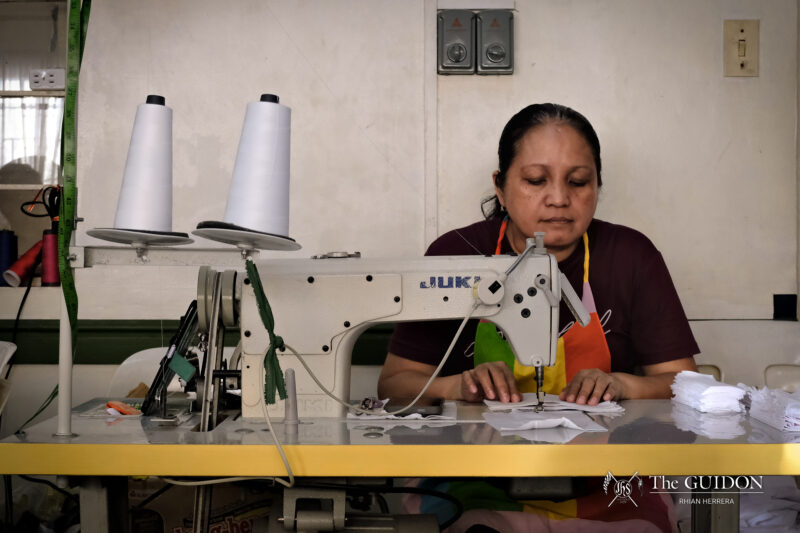Yes, 2008 is a thing of the past, but looking back might not be such a bad thing. After all, what 2008 brought the Ateneo was a series of (unfortunate and fortunate) events that made college life all the more interesting. Here, The GUIDON presents a retrospective of top events that shaped and shook the year that was.
Caf gets rid of plastic, styro
“Not many people follow the [“Bring your own baunan” (BYOB) and “Clean as you go” (Claygo) campaigns]. Our bus boys still clean up. There are some who follow the campaigns but not the majority (…) But when the trash implementation is compared, before, the trash used to total to 20 to 30 trash bags a day. But now, it’s only four to five bags. It is there that one is somehow gladdened, that though the campaigns are difficult to implement, the trash is reduced, now to more than 70%.”*
—Ruth Venancio, Ateneo Multi-Purpose Cooperative operations manager, on the student support for the BYOB and Claygo campaigns
“With BYOB, I think what is really needed is the involvement of the students and the faculty. Although I quite agree that it is a bit tedious to bring a baunan especially if you have to take-out food, the cost involved in using water and soap and in cleaning is a price that I am willing to pay. (…) I am in Singapore now, in [Nanyang Technological University]. There are a total of 16 cafeterias, but only a few use reusable wares. It is quite common to see styro plates and spoons and forks and plastic and styro cups. This makes me doubt a bit in how much our effort can help save the world, but it will make a difference to the Philippines at least, I hope.”
—EC Plan VI (III BS Ma), who eats in the cafeteria almost everyday the past semester, on what should be improved with the programs on the Ateneo’s environmental efforts
Trikes wiped from Katipunan
“Hassle talaga, kasi lalo na pag late ka na lalakad ka ng malayo, o kaya pag maulan ang putik putik. Nakakainis siya. (It’s really a hassle, especially when you’re late and you have to walk a distance, or when it’s raining and the roads are muddy. It’s really annoying.)”
— Sandra Castaños (III BS ME), who commutes to school via trike almost daily, on her reaction on last year’s trike ban
“We are thankful that the ban was lifted, because the experience was difficult. (…) At that time, we almost didn’t have money for food. Most of the passengers were students from the Ateneo or Miriam College, so we are hardly earning. (…) I hope Bayani Fernando would understand our needs. Before he implements a ban, he should find a way to help us whose livelihood is going to be affected. Driving a trike isn’t illegal.”*
—Tata Sumalinog, Katipunan tricycle driver, on his reaction on the lifting of the ban
Our teams shine in sports
“Like in the past years, preparation starts right after a season, meaning whole year round training (swim and sometimes gym), then we are always looking for new recruits din. We participate in pre-season competitions as well to gauge how much we progressed in trainings and to see what needs more focusing on.”
—Keshia Fule (IV AB Comm), lady tanker, on the swimming team’s preparations after last year’s University Athletics Associaton of the Philippines (UAAP) win
“We can’t push for UAAP yet until there are at least four teams from the schools participating in the UAAP, I think. But we are pushing for it to be recognized as a varsity team already. It’s like [the Ateneo Rifle Pistol Team] and Arnis; they aren’t part of the UAAP, but they are credited as varsity by the Ateneo.
—Mico Aquino (III BS Ma), team member, on the Muay Thai team’s preparations after topping last year’s NCR competition
“As early as now we’re building the team for back-to-back in UAAP Judo. [The Ateneo] has never done it before. But with a big part of the core line-up intact, a repeat is definitely not impossible. There are several tournaments that the Ateneo Judo team are participating in, one of them the nationals. We try to participate in as much as we can to get experience for the newer members and at the same time scout out players from opposing teams.”
—Paulo Luz (III BS HSc), UAAP judo tournament gold medallist and MVP, on the judo team’s preparations after last year’s UAAP win
Ateneo divided over RH Bill
“We appreciate the efforts of these members of the Ateneo faculty to grapple with serious social issues and to draw from Catholic moral teaching in their study of [the Reproductive Health Bill (RH Bill)]. We acknowledge their right to express their views as individual Catholics and appreciate their clear statement that their views are their own and not that of the University. However, [the Ateneo] does not agree with their position of supporting the present bill. As I said [in a previous letter] to Archbishop Aniceto and Bishop Reyes, it is the considered opinion of our moral theologians that, although there are points wherein the aforesaid bill and the Catholic moral tradition are in agreement, there are certain positions and provisions in the bill which are incompatible with principles and specific positions of moral teaching which the Catholic Church has held and continues to hold. We thus have serious objections to the present bill in the light of our Catholic faith.”
—University President Fr. Bienvenido Nebres, SJ, in a statement to the university community about the RH Bill
Ateneo helps in farmers’ march to regain land
“[The Office for Social Concern and Involvement (OSCI)] has been involved with the Calatagan farmers since last semester. We had made [Comprehensive Agrarian Reform Program with Extension and Reforms (CARPER)] our main advocacy for the year and the Calatagan farmers became the face of our advocacy. (…) This semester, our office helped in the march of the farmers towards Manila and in helping organize their stay in the Ateneo. We also helped by facilitating mobilizations for CARPER [last December]. We also helped in needs like medicine, food, water, and other donations. (…) Generally, the students who are already aware of the issue and the leaders of the various organizations are the ones who are most active in the campaign. But the majority of the student population is not that active. The key is to continue to give them opportunities that will aid and help them to be more involved.”
—Kristina Marie Aguilar, OSCI National Service Training Program program officer, on what the OSCI has done so far for the Calatagan farmers
Deaths in the community
“Fr. Roque Ferriols, our Philo prof, was very fond of Gabby. In fact, if there was anyone who knew Padre the most, it would be Gab himself. The day after his death, we learned that he would visit Padre and casually discuss life and existence with him. (…) Padre broke down into tears right there and then in class after learning of the news. He silently cried for 15 whole minutes and our lecture for that day was like a commemoration for Gab.”
—Portia Silva (III AB Comm), on the death of Philosophy classmate Gabby Doller
“Personally, it has really changed the department because I think we are more careful in trying to really relate [with] and reach out to other members. There was a kind of soul-searching and I think we tried to see where we could have failed. Why we weren’t able to sense what was happening. So I think there is more care in paying attention. I think each one is trying to communicate better and relate better. It’s very important to try to be more sensitive.”
—Philosophy Professor Leovino Garcia, Ph.D., on the death of teaching assistant Lorenz Tan
“In my opinion, the TA environment didn’t change at all. We were able to move on weeks after the incident and got back work for our next productions. The org room was pretty much the same although we lost one of our funny guys, that is Gelo [Brillantes]. There will be times that we miss his gags and all, but generally, there isn’t much of a change in the TA environment.”
—Exzell Macomb (III BS CTM), Tanghalang Ateneo (TA) member, on if the death of colleague Gelo Brillantes changed the TA environment
Topping university rankings
“[I planned to go to] the University of the Philippines or De La Salle University. [The rankings didn’t affect my decision.] The Ateneo [will feel] just like high school. I feel like I need a change in environment where I [will be] able to learn things outside of my comfort zone like commuting and being far away from home.
—Reina Nava, a high school senior from St. Pedro Poveda College, on the effect of the university rankings on her choice of college
You, what will you remember about 2008?
Visit www.g.theguidon.com, The GUIDON’s online magazine, for students’ responses.
*Translated from a mix of English and Filipino






